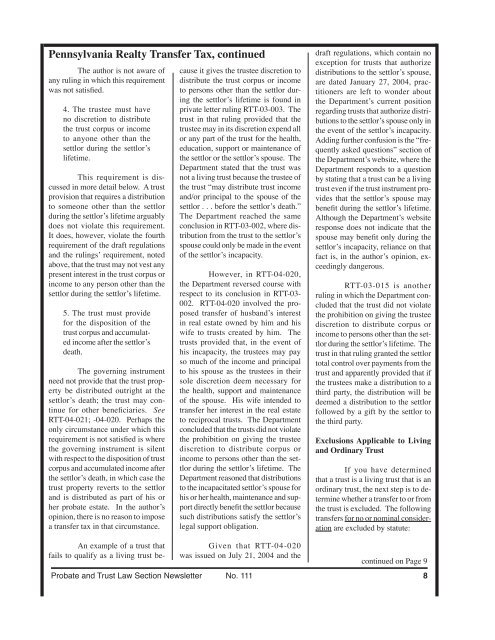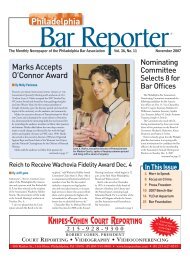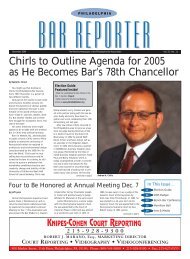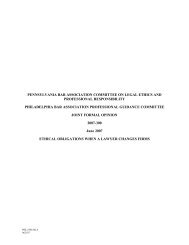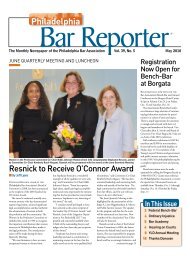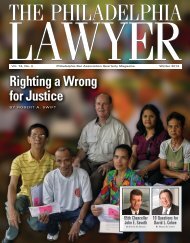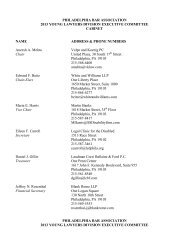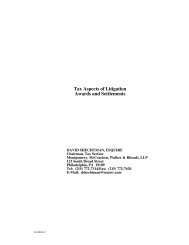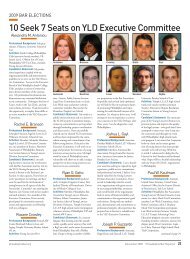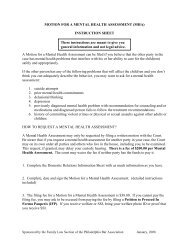Probate & Trust Newsletter: April 2005 - Philadelphia Bar Association
Probate & Trust Newsletter: April 2005 - Philadelphia Bar Association
Probate & Trust Newsletter: April 2005 - Philadelphia Bar Association
You also want an ePaper? Increase the reach of your titles
YUMPU automatically turns print PDFs into web optimized ePapers that Google loves.
Pennsylvania Realty Transfer Tax, continued<br />
The author is not aware of<br />
any ruling in which this requirement<br />
was not satisfied.<br />
4. The trustee must have<br />
no discretion to distribute<br />
the trust corpus or income<br />
to anyone other than the<br />
settlor during the settlorʼs<br />
lifetime.<br />
This requirement is discussed<br />
in more detail below. A trust<br />
provision that requires a distribution<br />
to someone other than the settlor<br />
during the settlorʼs lifetime arguably<br />
does not violate this requirement.<br />
It does, however, violate the fourth<br />
requirement of the draft regulations<br />
and the rulingsʼ requirement, noted<br />
above, that the trust may not vest any<br />
present interest in the trust corpus or<br />
income to any person other than the<br />
settlor during the settlorʼs lifetime.<br />
5. The trust must provide<br />
for the disposition of the<br />
trust corpus and accumulated<br />
income after the settlorʼs<br />
death.<br />
The governing instrument<br />
need not provide that the trust property<br />
be distributed outright at the<br />
settlorʼs death; the trust may continue<br />
for other beneficiaries. See<br />
RTT-04-021; -04-020. Perhaps the<br />
only circumstance under which this<br />
requirement is not satisfied is where<br />
the governing instrument is silent<br />
with respect to the disposition of trust<br />
corpus and accumulated income after<br />
the settlorʼs death, in which case the<br />
trust property reverts to the settlor<br />
and is distributed as part of his or<br />
her probate estate. In the authorʼs<br />
opinion, there is no reason to impose<br />
a transfer tax in that circumstance.<br />
An example of a trust that<br />
fails to qualify as a living trust because<br />
it gives the trustee discretion to<br />
distribute the trust corpus or income<br />
to persons other than the settlor during<br />
the settlorʼs lifetime is found in<br />
private letter ruling RTT-03-003. The<br />
trust in that ruling provided that the<br />
trustee may in its discretion expend all<br />
or any part of the trust for the health,<br />
education, support or maintenance of<br />
the settlor or the settlorʼs spouse. The<br />
Department stated that the trust was<br />
not a living trust because the trustee of<br />
the trust “may distribute trust income<br />
and/or principal to the spouse of the<br />
settlor . . . before the settlorʼs death.”<br />
The Department reached the same<br />
conclusion in RTT-03-002, where distribution<br />
from the trust to the settlorʼs<br />
spouse could only be made in the event<br />
of the settlorʼs incapacity.<br />
However, in RTT-04-020,<br />
the Department reversed course with<br />
respect to its conclusion in RTT-03-<br />
002. RTT-04-020 involved the proposed<br />
transfer of husbandʼs interest<br />
in real estate owned by him and his<br />
wife to trusts created by him. The<br />
trusts provided that, in the event of<br />
his incapacity, the trustees may pay<br />
so much of the income and principal<br />
to his spouse as the trustees in their<br />
sole discretion deem necessary for<br />
the health, support and maintenance<br />
of the spouse. His wife intended to<br />
transfer her interest in the real estate<br />
to reciprocal trusts. The Department<br />
concluded that the trusts did not violate<br />
the prohibition on giving the trustee<br />
discretion to distribute corpus or<br />
income to persons other than the settlor<br />
during the settlorʼs lifetime. The<br />
Department reasoned that distributions<br />
to the incapacitated settlorʼs spouse for<br />
his or her health, maintenance and support<br />
directly benefit the settlor because<br />
such distributions satisfy the settlorʼs<br />
legal support obligation.<br />
draft regulations, which contain no<br />
exception for trusts that authorize<br />
distributions to the settlorʼs spouse,<br />
are dated January 27, 2004, practitioners<br />
are left to wonder about<br />
the Departmentʼs current position<br />
regarding trusts that authorize distributions<br />
to the settlorʼs spouse only in<br />
the event of the settlorʼs incapacity.<br />
Adding further confusion is the “frequently<br />
asked questions” section of<br />
the Departmentʼs website, where the<br />
Department responds to a question<br />
by stating that a trust can be a living<br />
trust even if the trust instrument provides<br />
that the settlorʼs spouse may<br />
benefit during the settlorʼs lifetime.<br />
Although the Departmentʼs website<br />
response does not indicate that the<br />
spouse may benefit only during the<br />
settlorʼs incapacity, reliance on that<br />
fact is, in the authorʼs opinion, exceedingly<br />
dangerous.<br />
RTT-03-015 is another<br />
ruling in which the Department concluded<br />
that the trust did not violate<br />
the prohibition on giving the trustee<br />
discretion to distribute corpus or<br />
income to persons other than the settlor<br />
during the settlorʼs lifetime. The<br />
trust in that ruling granted the settlor<br />
total control over payments from the<br />
trust and apparently provided that if<br />
the trustees make a distribution to a<br />
third party, the distribution will be<br />
deemed a distribution to the settlor<br />
followed by a gift by the settlor to<br />
the third party.<br />
Exclusions Applicable to Living<br />
and Ordinary <strong>Trust</strong><br />
If you have determined<br />
that a trust is a living trust that is an<br />
ordinary trust, the next step is to determine<br />
whether a transfer to or from<br />
the trust is excluded. The following<br />
transfers for no or nominal consideration<br />
are excluded by statute:<br />
Given that RTT-04-020<br />
was issued on July 21, 2004 and the<br />
continued on Page 9<br />
<strong>Probate</strong> and <strong>Trust</strong> Law Section <strong>Newsletter</strong> No. 111 8


